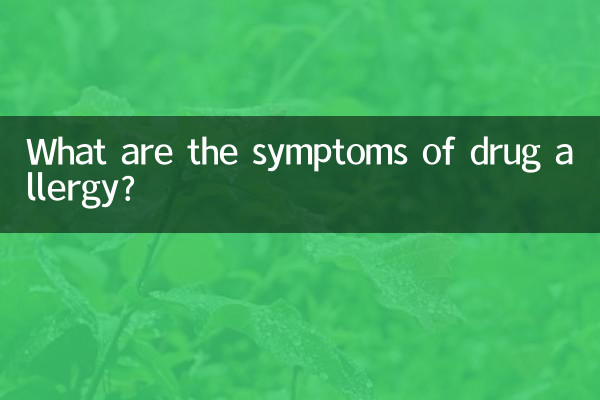What are the symptoms of drug allergy?
Drug allergy is an abnormal immune response of the body to certain drugs, which can cause symptoms ranging from mild discomfort to life-threatening symptoms. Understanding the common symptoms of drug allergies can help you identify and respond promptly. The following is a collection of popular discussions and structured data on drug allergies across the Internet in the past 10 days.
1. Classification of common symptoms of drug allergy

| Symptom type | Specific performance | Severity |
|---|---|---|
| skin reaction | Rash, hives, itching, redness and swelling | mild to moderate |
| respiratory symptoms | Difficulty breathing, wheezing, throat swelling | moderate to severe |
| digestive symptoms | Nausea, vomiting, abdominal pain, diarrhea | Mild |
| systemic reaction | Anaphylactic shock (sudden drop in blood pressure, confusion) | life-threatening |
2. Recent hot topics related to drug allergy
1.Discussion on allergic reactions to COVID-19 vaccine: Some people develop urticaria or facial swelling after vaccination. Experts emphasize that the incidence is extremely low but caution is needed.
2.Antibiotic allergy myths: Penicillin allergy is overdiagnosed, and the actual allergic population may only account for 10% of the claimed population.
3.Risk warning of traditional Chinese medicine injection: The State Food and Drug Administration reminds that Shuanghuanglian injection may cause anaphylactic shock.
3. High risk factors for drug allergy
| risk factors | Description | Prevention advice |
|---|---|---|
| Personal allergy history | Have ever had drug allergies or allergic constitution | Proactively inform the doctor when seeing a doctor |
| family inheritance | Immediate family members have a history of severe allergies | Get allergen testing |
| Drug properties | Highly allergenic drugs such as penicillin and contrast media | Skin test required before use |
4. Emergency measures
1.Stop medication immediately: Stop using suspected drugs as soon as possible after discovering allergic symptoms.
2.Keep airway open: If difficulty breathing occurs, immediately assume a semi-sitting and recumbent position.
3.Use anti-allergy medications: Take antihistamines (such as loratadine) as directed by your doctor. In severe cases, epinephrine injection is required.
4.Seek medical attention promptly: If serious symptoms such as laryngeal edema and drop in blood pressure occur, call emergency services immediately.
5. Practical Suggestions for Preventing Drug Allergy
| Precautions | Specific operations |
|---|---|
| Ask before taking medication | Take the initiative to explain your allergy history to your doctor |
| Keep drug instructions | Record the ingredients of drugs that have caused allergies |
| Wear a medical alert bracelet | Label severe allergy medication information |
6. Drug categories that require special attention
According to recent data released by the drug regulatory department, the following drugs have a higher number of reports of allergic reactions:
| drug class | Typical representative | Allergy incidence |
|---|---|---|
| antibiotics | Penicillins, cephalosporins | About 2-3% of drug users |
| antipyretic analgesics | aspirin, ibuprofen | About 1.5% |
| biologics | Vaccines, monoclonal antibodies | 0.1-0.5% |
Drug allergic reactions can occur minutes to weeks after taking a drug, and delayed-type allergies are especially likely to go unnoticed. It is recommended to closely observe physical changes after taking medication, especially if you are using a new medication for the first time. If you suspect drug allergy, you should keep the drug packaging and seek medical testing promptly to avoid exposure to similar drug ingredients in the future.
This article synthesizes recent data and clinical guidelines released by medical authorities and aims to provide a scientific reference. Please strictly follow your doctor's instructions when taking specific medications, and be sure to seek professional medical help if you experience allergic symptoms.

check the details

check the details